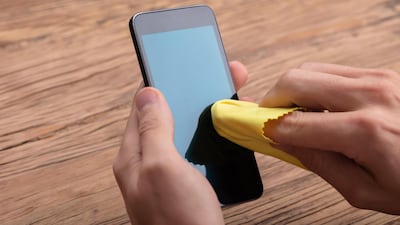Ever heard that old adage that your mobile phone has more germs than a public toilet?
Well, without wading into the debate on how close to the truth that quip really is, with the battle to quell the spread of the coronavirus being spearheaded by the cleanliness of our hands, it seems something of an oversight to leave out the things we are touching with those freshly-cleaned digits.
Namely, now seems like as good a time as any to introduce phone hygiene into our daily routines.
However, it probably goes without saying that phone companies' advice on cleanliness isn't going to kill off the virus from being transmitted on the surface of your phone. To do that, you're going to need proper disinfecting or alcohol wipes – like the ones Apple have just announced are safe to use on their phones.
How often should you clean your phone?
The advice around this is a little murkier, and seemingly ranges from anything to every hour, to twice a day (if you were to believe social media and its ilk). However, popular opinion seems to settle on the fact that it's a good idea to wipe it down at least twice a day, and perhaps as often as you are cleaning your hands.
Professor William Keevil, from the University of Southampton, told The Telegraph: "You could be washing your hands, but if you start touching your smartphone screen and then touch your face that is a potential route of infection."
How should you clean your phone?
This is almost identical across the board for most popular phone models, though there are some minor brand-to-brand differences. While Apple and Samsung have comprehensive guides on their websites, there isn't a lot of information on the likes of Oppo and Huawei. However, what does seem to be popular consensus is using a dry or slightly damp cloth to gently wipe away dirt or other contaminated particles.
Though it's not coronavirus-specific, the two big-hitters of the mobile world have detailed instructions on how to keep your phone squeaky clean. These are the generic instructions:
Apple:
In light of the spread of coronavirus, Apple has recently updated its advice around disinfectant wipes as a potential combatant against contamination. They've now said you can use a 70 percent isopropyl alcohol wipe or disinfecting wipes to "gently wipe the exterior surfaces of your iPhone". However, they have also stressed that people should not use bleach, and phones should not be submerged in cleaning solution.
Generic cleaning methods for iPhones differ depending on what model you have.
For iPhone 11 and up, you must remove its cover, unplug all cables and turn off your phone, before using a soft and slightly damp, lint-free cloth (like one you would use to clean your eye glasses) to wipe its surface.
If that isn't enough to remove any stubborn dirt, you can use a soft, lint-free cloth with warm soapy water – as long as you avoid getting moisture in openings (headphone jacks etc). You should also not use cleaning products to add the process, as they might corrode your phone's fingerprint-resistant oleophobic (oil repellent) coating, and could scratch your phone.
The above process applies for other earlier versions of iPhones, but you can't use the warm, soapy water method. The reason is the iPhone 11's upgraded glass material it's made with, which is tougher and water resistant (not to be confused with waterproof, but it would stand up to an accidental dunk in the pool).
For versions of iPhones that still have the "home" buttons, they can also be simply wiped with a soft lint-free cloth.
To clean any dirt that might have accumulated around the sim tray opening, you can use a cloth with a tiny amount of rubbing alcohol on it to gently wipe the dirt away from the port opening.
Samsung:
The South Korean company has not yet spoken about the ability to use disinfectant or alcohol wipes to quell the spread of the virus. Standard advice remains to use a soft, clean cloth to wipe the glass of your phone or tablet.
If your phone is particularly grubby, your can dampen a corner of the cloth with clean water and gently wipe its surface with an up-down motion.
Afterwards, use the dry part of the cloth to remove any excess moisture.
It is not recommended to use window cleaning solutions or any other cleaning aid that is made up of strong chemicals.

